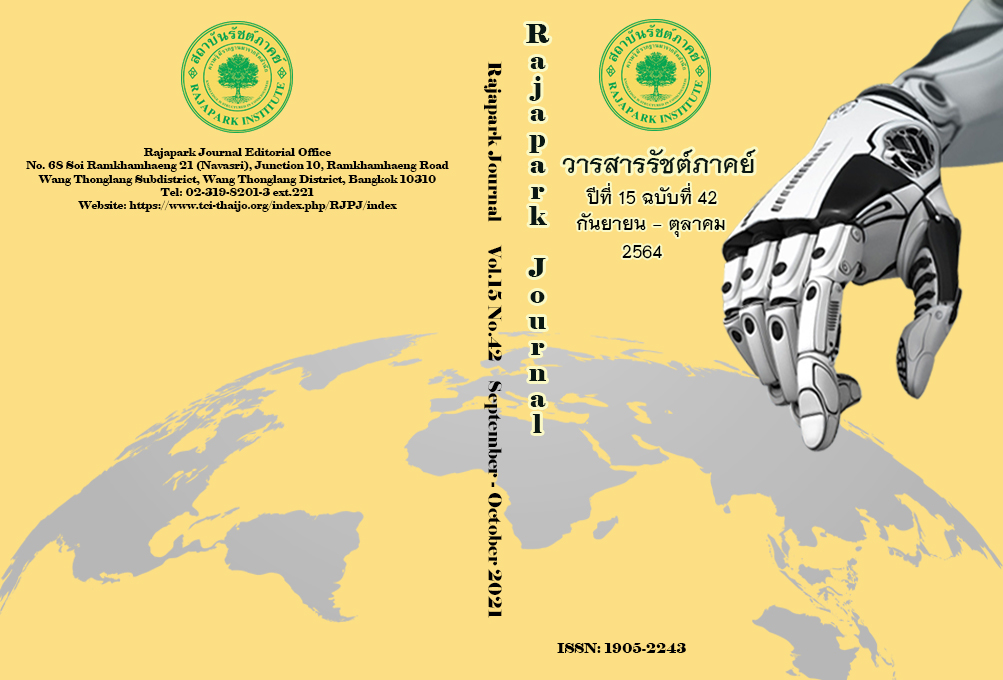The Essential Qualification for the Leaders of Disabled People in Chachoengsao Province
Main Article Content
Abstract
The purposes of this study were to: (1) investigate desirable characteristics of a leader of a disabled person as a request and provide information to leaders of disabled people about developing and changing duty roles for efficiency, and (2) study the limits of leaders of disabled people and respect from people as leaders of disabled people. This study was quantitative research. A sample was selected from 240 disabled people who live and contact the Division of Services for People with Disabilities in Chachoengsao province, using a random sampling method by the Yamane method (1967). The instruments used were questionnaires from 30 disabled people who contacted the Division of Services for People with Disabilities in Chachoengsao province. The findings were as follows: (1) Knowledge dimension, a leader of a disabled person should know the disability living allowance benefits, vision, management skills, work for society, and knowledge of welfare policies for people who have low income; (2) Skill dimension, a leader of a disabled person should have human relations skills and protect the rights of disabled people; and (3) Attitude dimension, a leader of a disabled person should have a good work history, generousness, and mercy, good human relations, work with sincerity, and solve problems with a healthy mind.
Article Details
Views and opinions appearing in the Journal it is the responsibility of the author of the article, and does not constitute the view and responsibility of the editorial team.
References
Chanboon, W., & Thongyou, M. (2016). The Processes of Disable People Fighting Towards the Social Beliefs. VRU Research and Development Journal Science and Technology, 11(1), 171-181.
Chalongsuk, R. (2015). Health Benefits of People with Disabilities. Silpakorn University Journal: SUJ, 35(2), 69-87.
Department of Empowerment of Persons with Disabilities [DEP]. 2015. Development of Personnel Management for Persons with Disabilities and Leaders with Disabilities in the ASEAN Context. Power of the Handicapped Booklet, 2015(No.19).
Janauksornkul. S. (2004). Roles of the Disabled and Their Families in Life Quality Development in A Community(Master of Education, Nonformal Education). Chiang Mai University.
Kangpeng, S., & Patiphan, K. (2012). Leader and Leadership. Retrieved February 27, 2016, from http://kit.kvc.ac.th/2012TechMJR/Leadership.pdf
Lamdubpunk, A. (2008). The Role of Local Administrative Organizations in Promoting the Quality of Life of Persons with Disabilities, Lan Saka District, Nakhon Si Thammarat Province(Master of Public Administration, Department of Local Administration). Khon Kaen University.
Lohakajornphan, S. (2004). Independent Occupation of People with Disabilities who borrow money from the Nakhon Nayok Rehabilitation Fund. Bangkok: Thammasat University.
Longlalerng, K., Lektip, C., Wannisa, K., & Sanpakdee, T. (2015). Perceptions and Attitudes of Community Leaders on Rehabilitation of Persons with Physical Disabilities in Community, Tha Sala district, Nakhon Si Thammarat Province. Thai J Phys Ther, 37(3), 113-125.
Mapong, S. (2008). Access to Rehabilitation Services of the Disabled Capability after the Disabled Registration in Particular the Comprehensive Disabled Registration at Saraburi Hospital(Master of Social, Work Social Welfare Administration and Policy). Thammasat University.
Nontapattamadul, K. (2015). Contemporary Social Work Theory. Bangkok: Thammasat University.
Phunyachome, S. (2010). The Acknowledgement of the Persons with Disparity of their Rights According to Article 20 of the Act of Empowerment of the persons With Disparity B.E. 2550: Case Study of Bangkok Metropolitan Administration(Master of Social Work, Social Welfare Administration and Policy). Thammasat University.
Srirungkarn, S. (2011). Expectations and realities towards primary health care services of the Wad Khokkat Health Promoting Hospital, Tambon Praipongpang, Samut Songkhram province (Master of Social Work, Social Welfare Administration and Policy). Thammasat University.
Srithong, N. (2008). Enhancement of Leadership Potential in Community Development. Bangkok: O.S. Printing House.
Srithong, T. (2011). Access and Utilization of Facilities for Visually Handicapped Persons under to Article 20 of the Act of Empowerment of the persons With Disparity B.E. 2550(Master of Social Work, Social Welfare Administration and Policy). Thammasat University.
Vilawan, B., & Nantiyakul, P. (2017). Administration of Quality of Life Development of People with Disabilities of the Prachinburi Provincial Administrative Organization According to the Sufficiency Economy Philosophy. EAU Heritage Journal Social Science and Humanities, 7(3), 139-149.
Yamane, T. (1967). Statistics: An Introductory Analysis (2nd ed.). New York: Harper and Row.


